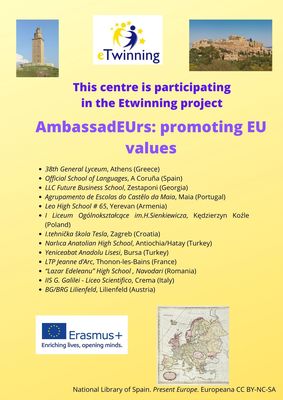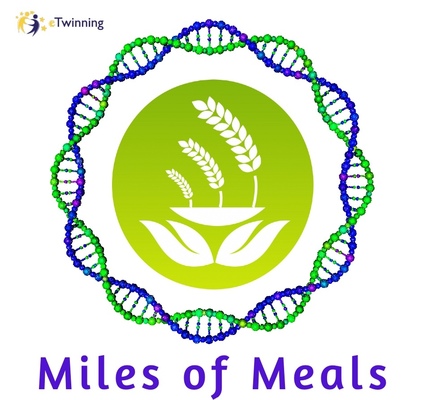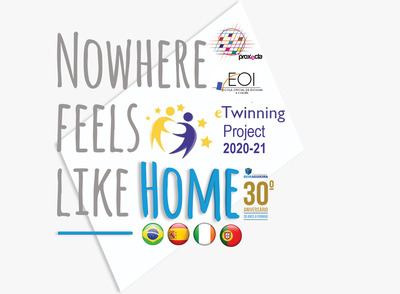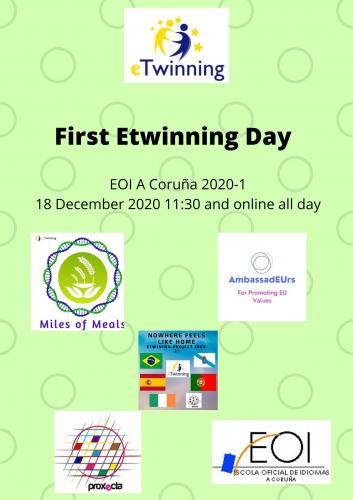|
|
|
|
|
|
NOVIDADE |
|
|
|
A nosa EOI da Coruña ven de obter o recoñecemento de Etwinning School (Centro eTwinning) 2023-2024 por parte de Etwinning Europe Este recoñecemento resalta o valor de aqueles centros que amosan unha participación activa e relevante en eTwinning, implicando a diferentes axentes da súa comunidade educativa, na que se respectan e coidan aspectos relacionados ca seguridade na rede, e se realizan accións de difusión que transcenden máis aló do centro educativo. |
|
ESKILLS/DESTREZAS DIXITAIS: APRENDENDO LINGUAS XUNTOS |
|
|
|
Internet supón unha plataforma moi atractiva para a aprendizaxe de idiomas. É fácil acceder ao material en liña e mesmo practicar habilidades lingüísticas en liña. Este proxecto pretende facer reflexionar ao alumnado sobre a riqueza lingüística de Europa e a forma en que aprendemos linguas a través da tecnoloxía. Os estudantes escollerán unha habilidade lingüística e discutirán o valor da aprendizaxe de linguas desde a perspectiva da súa lingua materna. A través dun intercambio de boas prácticas e actividades colaborativas, os estudantes reforzarán a súa competencia dixital e sentiranse máis seguros como estudantes de idiomas. Obxectivos: ●mellorar a competencia dixital ●practicar habilidades lingüísticas ●fortalecer o traballo transnacional entre distintos centros e linguas ●reflexionar sobre a propia aprendizaxe ●dar a coñecer a riqueza lingüística de Europa ●traballar colaborativamente en liña e na aula cara a cara Competencias: ● aprender a aprender ● dixital e tecnolóxica ● cívica ●alfabetización ●multilingüe ●emprendemento ● conciencia e expresión cultural Procedemento de traballo: Métodos de ensino: ● Aprendizaxe baseada na exploración/indagación ● Aprendizaxe interdisciplinar ● Aprendizaxe colaborativa ● Situacións de reflexión e análise de conceptos Proceso de traballo: Duración do proxecto: novembro de 2022 - febreiro de 2023 Frecuencia de comunicación: dúas veces ao mes, o grupo de alumnos compartirá e comentará os resultados das actividades. A comunicación podería ser máis regular no Twinspace. Os socios terán varias reunións en directo durante o proxecto para tomar decisións sobre o seu desenvolvemento. Motivación do alumno: Os alumnos que participarán no proxecto poderán aportar as súas propias ideas creativas e, polo tanto, realizar adaptacións das actividades do proxecto. Cooperación dos socios: Os fundadores e socios do proxecto comunicarán e compartirán a súa opinión para avaliar o desenvolvemento do proxecto. Ademais, acordarán a netiqueta do programa. Reforzarán a comunicación transnacional entre os estudantes. Resultados esperados: O alumnado elaborará unha infografía con todos os enlaces ao traballo realizado e que estará visible nas páxinas do proxecto Twinspace. |
|
A BOOK TRIP THROUGH EUROPE |
|
Europa é un mosaico de historia, culturas e tradicións. Este proxecto pretende dar a coñecer ao alumnado a diversidade da escrita europea no pasado e na actualidade. Elixirán os libros máis representativos dos seus países, aquelas obras que reflicten costumes, tradicións e o seu modo de vida e que non se poden perder. A través do proxecto os estudantes terán que realizar un traballo de investigación para emprender unha viaxe colaborativa para compartir impresión e descubrir a riqueza e peculiaridades das prácticas escritas no marco europeo. Obxectivos: ● Mellorar a competencia social, cidadá e intercultural promovendo o coñecemento e comprensión doutras culturas europeas, a comunicación intercultural, a tolerancia, o pensamento crítico e a participación cidadá. • Descubrir e respectar literaturas e culturas menos coñecidas • Promover a alfabetización • Promover e favorecer a internacionalización dos centros escolares. • Fortalecer a competencia dixital e a alfabetización mediática · Promover o interese e o aprecio polo patrimonio cultural material e inmaterial. • Facilitar as ferramentas para que a comunidade educativa recoñeza o patrimonio material e inmaterial do seu contorno para vincular ás persoas co territorio. • Aprender a usar as entrevistas como método para recompilar información · Desenvolver hábitos de traballo colaborativo con socios europeos e a interacción tanto coa contorna sociocultural propia como coa das comunidades educativas socias no proxecto eTwinning. · Introducir a investigación sobre diferentes manifestacións de patrimonio cultural material e inmaterial na programación de diferentes materias, buscando unha aproximación interdisciplinar. • Mellorar a competencia lingüística na lingua materna e nas linguas estranxeiras promovendo a diversidade lingüística da Unión Europea e valorando a lingua galega. · Mellorar a práctica profesional co intercambio de prácticas metodolóxicas innovadoras. · Participar en redes escolares europeas. · Promover no centro escolar o uso de instrumentos para o desenvolvemento dunha educación intercultural que xa se reflicten no Proxecto educativo de centro. Competencias: ● aprender a aprender ● dixital e tecnolóxica ● cívica ●alfabetización ●multilingüe ●emprendemento ● conciencia e expresión cultural Procedemento de traballo: Métodos de ensino: ● Aprendizaxe baseada na exploración/indagación ● Aprendizaxe interdisciplinar ● Aprendizaxe colaborativa ● Situacións de reflexión e análise de conceptos Proceso de traballo: As actividades publicaranse no Twinspace do proxecto e con evidencias do traballo colaborativo realizado e utilizarase a lingua galega no diario público do Proxecto. Serán deseñadas tendo en conta os principios do Flipped Classroom e do enfoque comunicativo. Canto a andamiaxe, tomarase coma referencia a taxonomía de Bloom para que o alumnado describa, compare diferentes realidades, investigue e finalmente analice información que terá que expor adecuadamente. Seguirase a secuencia: presentación da tarefa, debate sobre como abordala e posta en común canto a mellor ferramenta para enfocala. Os alumnos terán unha páxina no proxecto sobre ferramentas con algún videotitorial. Para a realización das actividades organizarase aos alumnos en equipos transnacionais que mesturen diversas capacidades e linguas, considerando tamén as preferencias e dispoñibilidade. Asimesmo, farase un traballo interdisciplinar entre departamentos e prestarase especial atención ao desenvolvemento de competencias clave e ao tratamento de elementos transversais. Procurarase facer participar no proxecto a toda a comunidade educativa, así como integralo na cidade a través da participación de ONXs, colectivos culturais e asociacións veciñais e integralo tamén na contorna do centro escolar. Resultados esperados: Ao rematar cada tarefa, haberá unha avaliación que consistirá en autoavaliación (o alumno de si mesmo), heteroavaliación (por parte do profesor) e coavaliación (o alumno de outros alumnos). Isto permitirá ao alumnado reflexionar sobre os seus logros, servirá para mellorar a calidade do proxecto aos docentes e asegurar o seu correcto desenrolo. As actividades do proxecto compartiranse no blog do Plan Proxecta ao final de cada trimestre dando conta do traballo desenvolvido e do grado de desenvolvemento do proxecto. O impacto e difusión do proxecto tamén se rexistrará nas páxinas webs dos centros, redes sociais e blogs de clase. Producto final “A book trip through Europe” caracterizase pola súa natureza inclusiva, que pretende desenrolar as competencias básicas de todo tipo de alumnado, de distintas idades e que estuda diferentes linguas. Ademais, enfócase coma traballo colaborativo de centro e a voz do alumnado será clave para o desenvolvemento do proxecto nas distintas etapas. Por todo isto, o producto final que proporemos consistirá na elaboración colaborativa dun libro dixital plurilingüe que recollerá unha selección do traballo feito e que será visible nas páxinas do proxecto en Twinspace. A decisión do material a incluír quedará nas mans do propio alumnado. |
|
AUF DEM WEG / NO CAMIÑO |
|
|
|
On the occasion of the jubilee year 2021-22 in Santiago de Compostela, we want to start an international project with partners from different countries-cities that have some kind of connection with the Camino de Santiago. The preferred languages are: German, English, French, Italian, Portuguese and Spanish, as well as the national language: Galician. The aim is to "connect" people / students "along the way" and exchange information about the language (learning), on various topics such as history, economics, culture, architecture, as well as the best advice for potential visitors and / or exchange pilgrims. . As co-founders of this project, we set off from Vilagarcía de Aurosa near Santiago de Compostela and found a connection to Jacob's network in Turkey via a sea route from Istanbul to Venice and beyond to Europe. At the end we will have traveled together the Camino de Santiago (real and virtual) and possibly knowing other pilgrimage routes. The objectives of this project are:
|
|
EUROHEROES OF OUR TIME |
|
"Euroheroes of our time" is a project on the preservation of our heritage that involves collaborative activities and production of material on various aspects of the participating countries. The main objective of this project is to understand the importance of human action to solve common European problems and preserve our common heritage and environment in Europe. Students will reflect on the figure of the hero in culture and society and its evolution over time. They will also focus on how to solve problems, and finally ask them to take on the role of heroes in preserving, disseminating and promoting their local culture in a European framework. The objectives of the project are:
|
|
NOVIDADE |
|
|
|
A nosa EOI da Coruña ven de obter o recoñecemento de Etwinning School (Centro eTwinning) 2021-2022 por parte de Etwinning Europe Este recoñecemento resalta o valor de aqueles centros que amosan unha participación activa e relevante en eTwinning, implicando a diferentes axentes da súa comunidade educativa, na que se respectan e coidan aspectos relacionados ca seguridade na rede, e se realizan accións de difusión que transcenden máis aló do centro educativo. |
| AMBASSADEURS | |
| The main aim of this project is to promote the cultural heritage of each country in relation to the common European culture and values. As “AmbassadEUrs” of their country, the students will seek and highlight the most important aspects of their country's culture. At the same time, they will explore aspects of history and everyday life that reflect important European values. They will also look for common cohesive links between the cultural heritage of their countries and common European culture. They will be involved in collaborative communication activities referring to the project both in national and transnational groups.
AIMS OF THE PROJECT:
|
 |
| MILES OF MEALS | |
|
Europe is a mosaic of multiple nutritional habits that depend on local ecology and influence culture. In this eTwinning project, students from different age groups and nationalities, based on the fact that nutrition has been a driving force for the development of industry and technology through the course of history, will travel along a time path of many miles of meals. During this trip, students will be assigned the roles of the scientist, archaeologist, food scholar, dietician, and chef in order to exchange information about their nations’ evolution of nutrition and its impact on health, lifestyle and folklore expression. The guiding lights of this trip are going to be major historic landmarks. The project intends to present the nutritional route that different nations followed due to special needs and conditions so as to promote the mutual understanding of different food cultures, make parallels between now and then and create good nutritional practices for future generations. AIMS OF THE PROJECT: Make students acquainted with:
Make students realize that:
Involve students in:
|
 |
| NOWHERE FEELS LIKE HOME (PLAN PROXECTA) | |
|
This is a project on urban popular culture. We will develop collaborative activities and products on various aspects of the participating cities (traditions, festivities, local peculiarities, collective sentiments, etc.). It will imply carrying out research activities on the so-called intangible cultural heritage and encourage reflection on its preservation. AIMS OF THE PROJECT: ● Enhance the knowledge and appreciation of the intangible European cultural heritage.
|
 |
CURSO 2019-20
| STORIES TIME CAPSULE |
|
Our teacher Carmen María Fernández Rodríguez is carrying out the project STORIES TIME CAPSULE. The main aim of this project is to get acquainted with the history of our city through the narrations from people and it will both provide students with a clear view of all the changes that took place during the past years and will allow the participants to compare urban changes around them with those in other countries. The students will be involved in collaborative communication activities referring to the project both in national and transnational groups. All the input and data sharing will enable students to reflect on historical legacy and the present and future projection of their city. The languages of the project are English, Greek, Spanish, Galician, French, Turkish, Italian and Croatian. There will be more 100 participants and the time period of the project will be from October 2019 to April 2020. This cross-curricular project deals with citizenship, environmental education, European Studies, geography, history of culture, ICT, geology, history, language and literature and social studies. The main aims of the project are: To work collaboratively in a team.
|
|
DIFUSIÓN DE PROXECTOS
|
|
|
Link First Etwining Day 2019-20 February 2020:
|
|
|
Link First Etwining Day 2020-21 December 2020:
|
|

| Anexo | Tamaño |
|---|---|
| Información proxecto.odt | 26.7 KB |